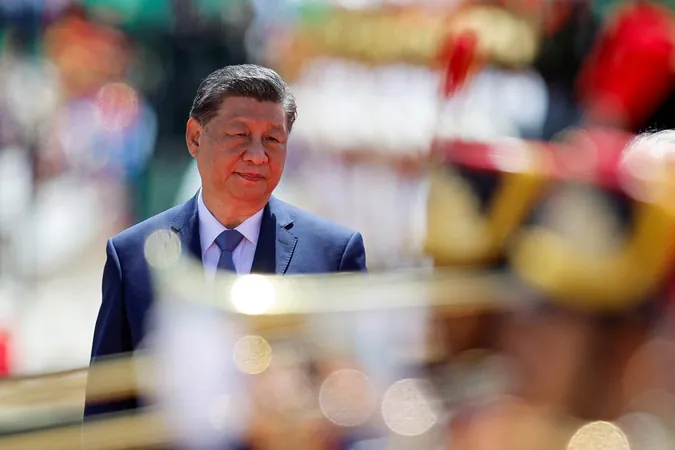
Xi Jinping Opts for High-Level Envoy at Trump's Inauguration – What This Means for US-China Relations
2025-01-10
Author: Wei Ling
Introduction
In a significant diplomatic move, Chinese President Xi Jinping has decided to send a top-level envoy to attend the inauguration of U.S. President-elect Donald Trump on January 20, as reported by the Financial Times on January 9. Rather than attending personally, Xi has chosen to delegate this responsibility to a senior official, indicating a nuanced approach in China’s relationship with the incoming Trump administration.
High-Ranking Envoy
Sources close to the situation disclosed that Beijing has informed Trump’s transition team about this decision. The high-ranking official attending in lieu of Xi is expected to engage in discussions with Trump's team, highlighting ongoing diplomatic efforts between the two nations.
Potential Candidates for the Mission
Among the potential candidates for this diplomatic mission are Han Zheng, a vice-premier known to stand in for Xi at ceremonial functions, and Foreign Minister Wang Yi. Another key figure mentioned is Cai Qi, a member of the Politburo Standing Committee and Xi’s right-hand man, who is viewed as possessing considerable influence within the Chinese government.
Historical Context
Trump previously extended an invitation to Xi in December. Political analysts noted that it would be unprecedented for a Chinese leader—historically the United States’ top geopolitical competitor—to attend a U.S. presidential inauguration, suggesting that Xi’s absence could stem from the tense backdrop of U.S.-China relations.
Trump's Approach to China
On January 6, Trump expressed confidence in developing a positive rapport with Xi through ongoing discussions via representatives. However, his administration appears poised for a tougher stance on China, indicated by the appointment of known China experts, such as Senator Marco Rubio, to key positions, including Secretary of State.
Economic Measures and Tensions
Moreover, Trump has threatened economic measures against China, including an additional 10% tariff on Chinese imports unless the country enhances efforts to curb the trafficking of fentanyl, an opioid linked to the ongoing drug crisis in the U.S. This follows through on his campaign rhetoric of imposing tariffs exceeding 60% on Chinese goods.
China's Response
In response to Trump’s recent remarks, the Chinese Foreign Ministry emphasized the importance it places on maintaining stable and productive economic relations with the United States, suggesting that both nations are seeking to navigate these choppy waters of diplomacy and trade.
Conclusion
As the inauguration approaches, both countries are closely watching each other’s moves, and the choice of envoy may signal China’s strategic priorities as it prepares to engage with a potentially confrontational U.S. administration. The implications of these decisions for global diplomacy and trade will be paramount in the coming months. Stay tuned as we uncover how this engagement unfolds and its impact on international relations!


 Brasil (PT)
Brasil (PT)
 Canada (EN)
Canada (EN)
 Chile (ES)
Chile (ES)
 Česko (CS)
Česko (CS)
 대한민국 (KO)
대한민국 (KO)
 España (ES)
España (ES)
 France (FR)
France (FR)
 Hong Kong (EN)
Hong Kong (EN)
 Italia (IT)
Italia (IT)
 日本 (JA)
日本 (JA)
 Magyarország (HU)
Magyarország (HU)
 Norge (NO)
Norge (NO)
 Polska (PL)
Polska (PL)
 Schweiz (DE)
Schweiz (DE)
 Singapore (EN)
Singapore (EN)
 Sverige (SV)
Sverige (SV)
 Suomi (FI)
Suomi (FI)
 Türkiye (TR)
Türkiye (TR)
 الإمارات العربية المتحدة (AR)
الإمارات العربية المتحدة (AR)